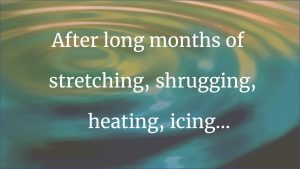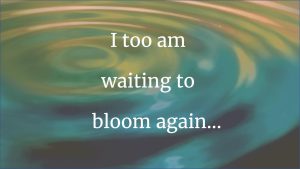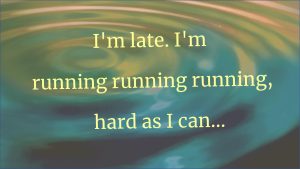Ginny Hoyle
I walked through my mother’s madness
in a coat of hungry colors.
Her eyes did not take me in. I was a child.
To win her, I hung by my knees from low branches
of the family tree, voicing nursery rhymes
from the hallowed text of her delusions.
And failed.
When they took her away,
I was older, careful. I hid my heart
behind a dozen jars of her best grape jelly
and drew ugly faces in my algebra notes.
When she came home,
I had no space to give her.
No, no, not in the kitchen;
my kitchen now.
Not in the blue chairs where she longed
at last to sit down, light up and chat.
When she died she died fast, leaving me
to count the years lost in smoke.
So much untold.
So much unasked.
Now I argue with the wind,
beat fists against a wall of air.
Invisible child, invisible scabs
on invisible knees. Crazy
how I never cried.
About the poet:
Ginny Hoyle is a former freelance writer whose poems have appeared in a number of journals, including The Baltimore Review, Copper Nickel and Pilgrimage. Through collaborations with artist Judy Anderson, her poetry has been featured in art installations and small-edition artist books distributed by Vamp&Tramp, Booksellers. She leads haiku workshops for the Academy for Lifelong Learning and is an eighteen-year member of Denver’s Lighthouse Writers Workshop.
About the poem:
“Maybe it’s time to stop making a distinction between mental illness and other kinds of illness. Disorders of the mind are rooted in the body in ways that are still stubbornly hard to figure out. There are no visible wounds, but wounds are inflicted across the immediate and extended family. And the scars that linger are scars on the psyche–invisible scabs. This poem is one of many written after my mother’s death, as part of the work I needed to do to move from anger and shame to acceptance and respect for what she endured.”
Poetry editors:
Johanna Shapiro and Judy Schaefer







19 thoughts on “Crazy”
Your beautiful poem really moved me. Thank you for showing how mental illness can ripple through families and hurt more than the afflicted person.
I found your poem by accident, Ginny. Blew me away!
Your imagery … the way you told this painful but beautiful story. Here’s an interesting part of how I read it though. The way it first came up on my computer,
I thought it ended at the line “at last to sit down, light up and chat.” And I LOVE it there, the subtlety of where I thought it ended, with imagery of the cigarette that would maybe or maybe not be lit by the woman who may or may not come sit again in your blue chair. For me, it made the poem more alive, with porous boundaries, breathing space.
Thank you for such a surprise in my day — your poem that gave me so much.
Deborah
Thank you for this poem. It touched me very deeply. I would love to know where I can read the other poems written after your mother’s death that enabled you to deal with the anger and shame. This country is so shameful, primitive, violent, cruel in its dealings with mental illness. My mother was a psychiatric nurse from the 1930s through the 1970s probably because she struggled with her illness so much herself. In fact she taught psychiatric nursing on the university level, after she struggled, as a single mother and working night shifts for years, to obtain the required credentials/education to do so. I grew up hearing much about her despair and seeing how awful the treatment was even for her.
Jean,
Thank you ao much. Send me an email, separately fro this site, with your mailing address and I’ll send you a couple of the other poems. Thank you for sharing this note about your mother’s struggle.
Ginny
ginnyhoyle@comcast.netk
From NYT (April 9): There are about 10 million Americans with mental illness and only 45,000 inpatient psychiatric beds. (Jails and prisons are the nation’s largest mental health care facilities.)
A wonderful poem, Ginny. Heart-wrenching, and drives home for me the wounds that mental illness inflicts on family and loved ones beyond those that the affected individual bears himself or herself. It truly becomes a family burden, doesn’t it? Thank you for sharing this–what a gift you have!
Touching. I think it would take a whole book on mental illness to capture what you just expressed in this poem. Thank you for sharing this.
Eric, thank you. That means a lot coming from you.
Your words will undoubtedly resonate with many, Ginny. You have an amazing gift of capturing the painful feelings that are so hard to express.
Thank you, Cindy. That means a lot to me.
An incredible poem, Ginny. An opening to your soul and wounds that are profoundly hard to heal. Bless you for sharing..
Thank you, Don. I appreciate that so much.
Ginny, your poem was beautiful. Sadly, society continues to stigmatize those with mental challenges while accepting those with physical ones. Mental illness is as real as cancer or diabetes. Those who suffer from mental illness deserve our support, our sympathy, and our acceptance. All individuals–regular people and healthcare providers– need to read your poem and learn from it.
Ronna, Thank you so much. I appreciate so much what you are saying about this invisible epidemic. It takes a terrible toll on American families. It’s time to bring it out of the shadows. Thank you.
Very moving poem. The art by Roberto Beary complements it perfectly. I’m a fan of her work.
Pris, I was struck by that, too. And, I, too am a big Roberta Beary fan. So that was just a beautiful surprise. Thank you for your kind words. Ginny
A sad but beautiful poem. Thank you for sharing it.
This poem is so beautiful. Thank you.
Wonderful, touching, powerful poem